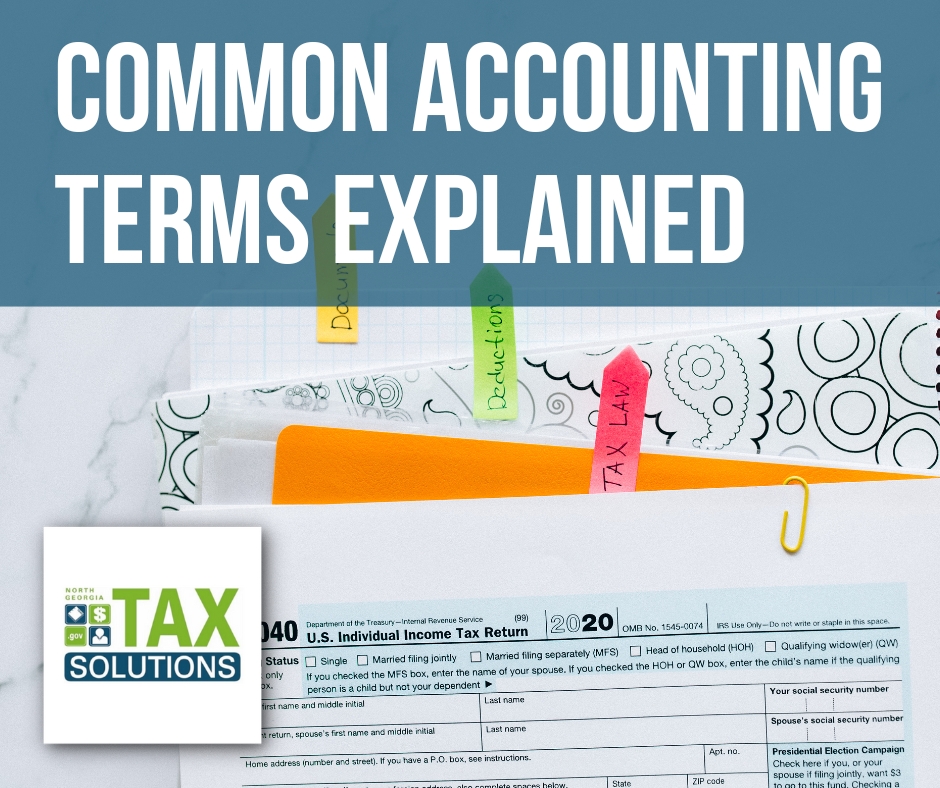Whether you have been in business for dec ades or are just getting your business off the ground, you are probably familiar with the massive
ades or are just getting your business off the ground, you are probably familiar with the massive
library of accounting terms a businessperson needs to know. If you’re not an accountant, you may find yourself unsure of certain terms relating to those absolutely essential conversations business owners may find themselves engaged in.
We’ve put together a list of some of the most common accounting terms that any business owner should be familiar with. If you’re still stumped on connecting all the dots when it comes to your business’s finances, contact North Georgia Tax Solutions today for a consultation!
Accounts Receivable/Payable
Typically, the terms Accounts Receivable and Payable, often abbreviated as AR/AP, are some of the most used terms when discussing the financial side of your business. Accounts receivable (AR) refers to all of the money from the company’s revenue and sales that has not yet been paid by the company’s customers/clients, but should in the future. Accounts Payable (AP) refers to the expenses the company owes to its vendors/suppliers that have not yet been paid, but should in the future.
Balance Sheet
One of the key components of a meeting with your accountant will be your balance sheet. Your balance sheet is a financial report that lists all of the company’s assets, liabilities, and equity. This will be the formative report to give insight on the company’s financial status. Equity is what the accounting book value of the company is. Mathematically Assets minus Liabilities = Equity.
Income Statement aka Profit and Loss
This tells you the items of income and expense (revenue and cost) of the company. The net is the net income.
Cash Flow
This term is used to describe the movement of cash into and out of your company. It can be used to give an accurate representation of the flow of cash and cash equivalents moving in and out of your business or organization’s accounts. For most people, it’s easier to understand “if I made $100,000, why don’t have I that in my bank.” The statement of cash flows tells you where the money went.
Part-Time CFO
The role of the Chief Financial Officer in your business or organization is typically responsible for overseeing financial aspects of the company, so you may be wondering what it means when you read ‘part-time’ CFO in accounting terminology. This is typically someone who performs CFO duties for a company that does not need a full time CFO, but still would like to retain a strong financial advisor to aid the company’s decision makers throughout the company’s lifetime.
Succession Planning
An important factor in your business structure, and one that typically requires the oversight of a financial advisor, is succession planning. Succession planning is a process in which a plan is laid out to identify potential exit strategies, future staffing and other business-related decision directions to ensure that the future needs of the company or organization can be met. Succession planning revolves around ensuring essential positions are filled within an organization and that specific individuals can be ready to move into those positions.
Want to Learn More?
If you have any questions about these terms or any other aspect of your company’s finances, North Georgia Tax Solutions is here for you. Our expert accountants are here to make the world of finance software and documents easier to navigate. To learn how outsourced accountant services at North Georgia Tax Solutions can help your business succeed and eliminate the stress of handling your own finances, contact us today!
